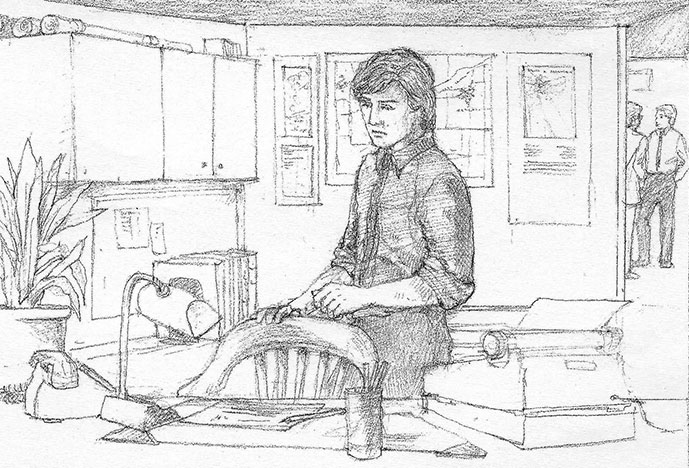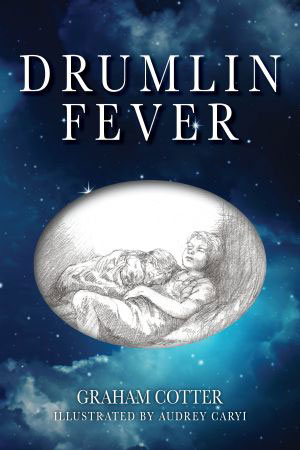Drumlin Fever
by Graham Cotter
County Planning

Illustration by Audrey Caryi
Albert Scace walked into the neat modern County Administration Building. It had taken him only twenty-five minutes to drive down from Warkworth, on a beautiful summer morning with clear skies. Last night’s fog had cleared early and the countryside was at its best. As he drove the last few miles he noticed the `strip’ development along the highway. It was not like other such developments, with garish gas stations and cheaply constructed hotdog and hamburger stands; rather, there were more and more pleasant residential houses springing up along the way. The old village of Baltimore, with its disused cheese factory, antique stores and typical rural Ontario `Variety Lunch’, was hardly noticeable among the new suburban houses in various stages of construction, or the older settled tree-girded houses on the hogback just above the McDonald-Cartier freeway. He wondered what was in store for Percy Township if Own Your Own Ontario had its way.
The County Conservation Authority outer office had great maps on its walls, with various geographical features showing. Just outside his own cubicle, a set of drawings and plans set out the advantages and disadvantages of the proposed Hope Township landfill project. The railroad was proposing a huge landfill operation to bury Metropolitan Toronto’s unmanageable garbage after it had been trucked in box cars. Conservationists were mostly on the one side in that argument, but there was the other side, with compelling arguments and probably government on its side. Again he thought how a scheme like that would affect his beautiful Northumberland hills. Fortunately, the railroad had no convenient spur line close to his countryside. But earth movers could make enough mess without one bag of city garbage to throw in.
Albert took his jacket and settled down to his desk. There would be the Hartford Marina scheme… that there were some plans to increase the number and strength of the river groins along the Trent near Healey Falls. Then he noticed a scribbled note on his desk.
“Bert.” it read, “Skip wants to see you as soon as you come in.”
Skip was his boss, the County Manager. He wondered what the problem was today. Skip was not always friendly towards the activities of the Conservation Authority, but it was a legally constituted board with clear powers set out in an Act of Provincial Parliament. So the real problems which arose with Skip were not of basic policy, but of the application of issues connected with the availability of trucks, equipment or labour from County Roads.
Albert stuck his head in the secretary’s door.
“Someone wants to see me?” he enquired.
“Someone does,” replied Marianita.
In spite of her romantic name, derived from her mother’s love of romantic novels, Miss Marianita Beggs was in most respects a typical rural Ontario lady of uncertain age. She retained the farm girl’s sense of humour, and also the sweptback short cut hairdo which seemed to go with a square face, short body and the blue eyes in the parts she came from. “Go on in.”
Skip Martin was sitting behind his desk, his feet up on it, looking soberly into the middle distance through his big window. With a flush of hostility, Albert thought of President Nixon, listening to the re-runs of Watergate tapes. Martin’s eyes slowly came into focus and swung over to the redheaded engineer.
“Morning, Bert,” he said, “How’re things in Warkworth?”
“I’ve seen more of Hartford than Warkworth lately, unless you’re talking of things at home. Things at home are just fine. What’s up?”
“Trouble from Tronna.”
Skip Martin didn’t know what scorn some people poured on this pronunciation of the name of Toronto the Good, the Queen City, also known to some as Hogtown.
“Been complaints about you interfering with commercial enterprise in the real estate business.”
“You’re kidding.”
“No. Seems a Mr. Hugesson is a big shot in the Nautilus Corporation, and he’s been complaining to the Minister of Municipal Affairs. Says one of Nautilus’ subsidiaries is trying to buy up land in your area, and that the local representative of the Conservation Authority is impeding progress.”
“Is that so, How?”
“Not specified.”
“Then don’t pay any attention. If anyone has a charge to make, let him make it in writing. If it is justified, then the Authority can take action against me. If it’s not justified, I’ll sue for defamation and libel.”
“Bert, B-E-R-T! You can’t sue these boys! They have money and power. Even the Ministry is afraid of them. You’d be fired if you tried.”
“No, I cannot be fired without a hearing before the Ontario Civil Service Commission, and I can make an appeal to the civil courts of Ontario. I am a free citizen, and the only power I recognize is that of the Crown, which represents the people of Ontario and established law. I’m not going to be intimidated by some fat-ass on Bay Street who entertains the Minister to cocktails at the Albion Club.”
Albert was raging now, warming up to his subject.
“Bert. Calm down. Forget you’ve red hair and six feet of bad temper. Remember you’ve a wife and kids to feed.”
“There’s not an ounce of truth in this man’s allegations. In my capacity as an officer of the Authority I have in no way interfered with any private commercial enterprise – much as I’d like to sometimes. I have carried out the directions of the authority in every case. When surveying land I have always had the owner’s permission – and glad permission, since I’ve known most of the farmers since I was at school. They know I’m looking out for their best interests.”
“Bert, they’re beginning to get to know your name at Queen’s Park, since the grass sod incident. They’ll blacklist you, and next thing you’ll be out on your ear.”
“Who are `they’, who can act outside the law against a public employee? The way you talk I’ll begin to believe the things Mortie brings out in the Legislature.”
“Bert!” shouted Skip, “For cripes’ sake don’t get Mortie in on this!”
“I’ve no intention of doing so. But the last time they threatened me from Queen’s Park the Authority backed me up to a man. Imagine those city idiots in Toronto demanding sod, at Lord knows how much a foot, for the new pondside in Warkworth, when twenty five dollars’ worth of
grass seed, and God’s sun and rain could do the trick. Who’s on the side of the Ontario taxpayer, anyway?”
“Bert, don’t get political. That’s out for civil servants. Anyway, what have you been doing to get the old bugger from Nautilus upset?”
“Nothing I can think of, unless it was that creep from Own Your Own Ontario yesterday.”
“Who was that?”
“Fat slicker came wanting to buy some land. Turfed him out.”
“Hit him?”
“Course not. Just gave him a warning and pointed to the manure heap.”
“Why were you so sore at him?”
“Do you know the outfit? They’re buying up usable farmland and cutting it up into little chunks for city folk to buy.”
“Are they within the law?”
“Not sure that they are. Of course a lot of people in the township like the thought of more people buying in their stores and paying taxes, but nobody says much about sewage or roads, or the garbage left at the side of the road. And what can you do with little two acre lots all over the place? You can’t farm them productively.”
“Lots of that land isn’t being farmed productively anyway.”
“No, but there are two sides to that. For real farming what is needed is big acreage now, not splitting the countryside. No one says ‘you can’t sell your farm, the land’s too good.’ The owner has an absolute right to do what he likes. The other thing is you can’t have decent reforestation projects with all these little allotments.”
“Bert, property is the basis of our law.”
“A lot of our law. But the Crown has an absolute right to control property if it wishes to, and in that there’s some hope of enforcing sensible land use in Ontario. Most of the time Queen’s Park hasn’t the guts to use its power. Look at the Pickering Airport.”
“Bert, you’re being political again. Anyway, you kicked out the Triple O man in your capacity as a private citizen.”
“Yes, without violence or assault. The skunk threatened he’d get at me through this office anyway. Tell you what, you do me a favour.”
“What?”
“You had a phone call from the Ministry? You musta.”
“Yep.”
“Write a letter, re the telephone call. Say that the discipline of employees of the Authority must go direct to the Authority and not your office. Ask that Nautilus write complaints directly and specify what happened. I guarantee they’ll never write another letter.”
“Okay Bert, but take my advice. They’ll find ways to get you. These are big boys with big money and they won’t take interference. They have long arms.”
“I’m sure they do,” said Albert getting up, his good humour restored.. “And I have deep roots in my land. And the land is very dark in the countryside at night, even the full of the moon.”
With these enigmatic words Albert strode out and back to his desk. He found it hard to settle to the problems of Hartford Pond. Before him were the multi-coloured maps of the regional study brought out by the Provincial Government a few years before. It was clear enough that the area south east of Rice Lake and north of Brighton was intended to remain primarily in existing agricultural and conservational use, with some development of recreational facilities. But a later study showed that Cobourg and Port Hope were to become one large urban centre: then the Northumberland Hills would be under pressure to be suburban. Already cedars would not live close to the provincial and county roads from the automobile emissions. Soon the pollution would spread.
The county had changed in fundamental ways since the first Scace had cleared the land for farming on the heights above Warkworth over a hundred years before. The township population had been cut in half, and was only beginning to increase again because of the prison guards and their families, and the ex-urbanites who in increasing numbers were buying farms and settling into their version of country life. Most of his schoolmates had moved away, to live in town or Toronto. Of those who remained to farm the land they had inherited, almost all who remained on the family farm had full or part-time work: driving for the township of the lumber company, picking-up for the cheese factory, or hiring themselves and their equipment out for piece-farming as they were needed by other part-time farmers. A sturdy few with enough acreage and equipment could make a living, and a life worth living, on the land alone. Of these, several were brave immigrants from Holland, or Eastern Europe.
What would be the effect of the Triple O and such ventures on the land he loved? He regarded most city folk as rootless and having more money than sense. But the local folk were not always careful of their heritage. Living with it year in, year out, they often lost sight of its beauty and its value. They would throw out priceless family tools and furniture for some flashy item from the chain store or the mail-order catalogue and they preferred the slick Don Mills suburban architecture to the solid lines with gingerbread woodwork of Victorian brick and frame houses.
He was more appreciative because he had spent some time being educated in the city, and knew its dense foul air, its callous pushing crowds. Out here he could breathe, and on the coldest day of the winter, after spending the day over his desk in the County office, he could hardly bring himself to go indoors when he reached the farm.
What kind of countryside would be left for his children? Even now, though much as they did a lot for farm work, both for him and for his neighbours, the boys had in him, their father, an example which led away from the farm, if not from the countryside all together. Would the hills and fields he loved be jam packed by little bungalows side by side? Already the rural kids screamed about the country on scooters in the summer and snowmobiles in the winter, and they threw as many beer bottles out of travelling cars as city folk. Would his precious unploughed and un-gravelled lanes, and his overgrown road allowances, special favorites when he had time to stroll around, be coated with asphalt and stink with fumes?
He didn’t know the answer. His job as a conservationist in the public employ allowed him to keep some streams running and some slopes forested, but no one was officially in charge of conserving good values, the sense of beauty, neighborliness, and plain truth among folk. Gloomily, he settled to the task at hand.
Drumlin Fever is now Available for Sale
Great News! Drumlin Fever has now been published. (Sept 2020)

The cost is $20 + $8 shipping and handling if delivered within Canada.

